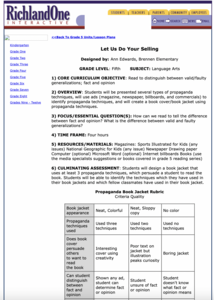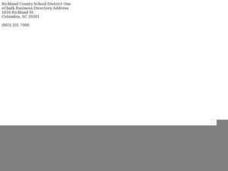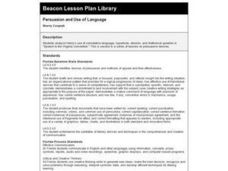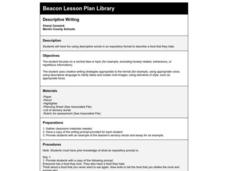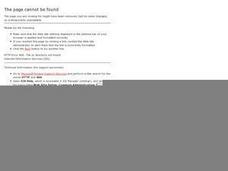Curated OER
Where Do We Come From? who Are We? Where Are We Going?
Students are responsible for producing works for, coordinating (with the teacher?s assistance) and mounting an exhibition to be presented at a parent-teacher open house. They examine literature by Henry David Thoreau and other writers....
Curated OER
Let Us Do Your Selling
Sixth graders analyze several types of propaganda techniques and create a book cover using the techniques. In this propaganda techniques lesson, 6th graders analyze the propaganda techniques used in various ads. Students analyze the...
Curated OER
Emergency Preparedness
High schoolers take a closer look at emergency preparedness plans. For this writing skills lesson, students evaluate the severe weather, natural disaster, and threat plans in place at their school and then write their own improved...
Curated OER
Storytelling Lesson Plan
Learners examine what storytelling is, and what makes a good storyteller. They read stories from Spooky New England, and choose one to memorize and tell to the entire class. They critique each other's storytelling abilities.
Curated OER
Where's Walden and Why Henry?
Sixth graders understand how Thoreau can serve as both inspiration and model for the investigation of home places. They explore ways to become better observers of natural and cultural history. Students find out how to connect with their...
Curated OER
Country Research (World)
Sixth graders use information that they have gathered to create a multimedia presentation using a program such as PowerPoint or HyperStudio. They use a bibliography sheet to cite all information they have gathered.
Curated OER
Life Size Characters
Sixth graders analyze character traits and create a life size character outline. In this character analysis lesson, 6th graders analyze character traits of a character using character webs and poems. Students then create a life size...
Curated OER
The Impact of History: A Conversation with a Parent
Seventh graders interview parents about certain historical events. In this historical interview lesson, 7th graders create a web of events about historical events. Students interview their parents or grandparents about the event and...
Curated OER
A Day in the Life of a Veteran: Oral History
Seventh graders conduct an interview with a veteran of a recent war to provide an account of military conflicts. In this oral history lesson, 7th graders research a recent war and write interview questions for their research. Students...
Curated OER
Pirates: Fact or Fiction?
Young scholars gain an understanding of what pirates are and to prove they really did and do exist. They discuss the different myths the students have about pirates as compared to what the documentary discusses.
Curated OER
Exploring the Library
Young scholars explore ways to use the library as a resource for accessing research material. Working individually, they participate in a teacher created library scavenger hunt to aid in locating fiction and nonfiction material as well...
Curated OER
Magnificent Mythology
Sixth graders research Greek mythology and explore mythological references. In this Greek mythology lesson, 6th graders view a PowerPoint about Greek mythology and read myths and their characteristics. Students discuss the relevancy of...
Curated OER
Families of Mount Olympus
Sixth graders explore Greek mythology. In this Greek mythology lesson, 6th graders research selected Internet sources on Greek gods and goddesses. Student use their research findings to create mythology family tress. Students also read...
Curated OER
The Bard: Shakespeare Up Close
Students choose a Shakespearean play to reenact into a modern setting. In this Shakespeare instructional activity, students practice insulting each other using Shakespearean language. Students watch Shakespeare plays and complete online...
Curated OER
Early Myths of Flight
Students explore mythology by researching the Internet. In this history of flight lesson, students view websites discussing the first recorded flight and the mythological creatures that people suspected could fly. Students read a...
Curated OER
Story Maps and Boxes
Learners use a story map template to review the parts of a story and information about a book that they have read. The elements of the story are identified and placed into story boxes and shared with classmates.
Curated OER
What's for Dinner? (Using Adjectives)
Sixth graders use adjectives to describe foods listed in restaurant menus. In cooperative groups, 6th graders create menus and identify the adjectives used in the menu created by their group.
Curated OER
Ring, Ring...Please Get That Phone
Learners create multimedia PowerPoint presentations using proper telephone procedures.
Curated OER
Persuasion and Use of Language
Pupils discuss connotative language, hyperbole, allusion, and rhetorical question. In small groups, they read one section of the "Speech to the Virginia Convention" and analyze these devices. Groups present their results to the class.
Curated OER
Descriptive Writing
Third graders have fun using descriptive words in an expository format to describe a food that they hate. They utilize a planning worksheet that's imbedded in this plan before they begin their drafts.
Curated OER
All Aboard! All Aboard! The Essay Train
Third graders enjoy a train ride with The Little Engine That Could and discover how to create a five-paragraph essay train. This clever instructional activity has students use each boxcar of the train as a template for a paragraph.
Curated OER
Reader's Theater, King Lear, and the Language of Gesture
Students perform a Reader's Theater of a small section of the play, King Lear. They examine the text, read a handout for Reader's Theater techniques, cut and reorder lines in small groups, and add choreography to perform their scene.
Curated OER
Fairness
Students distinguish between that which is fair and that which is unfair. They offer solutions as to how to remedy a seemingly unfair situation. They also engage in a role play situation and offer solutions.
Curated OER
7 Habits
Students study the qualities and responsibilities of becoming a good citizen. They, in teams, produce a video of one of the habits from the 7 Habits for Highly Effective Teens program.



